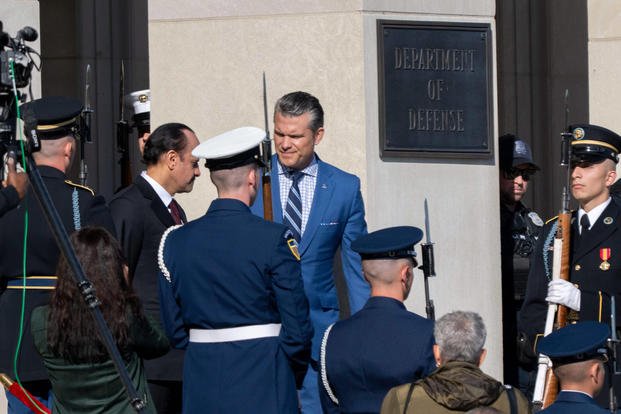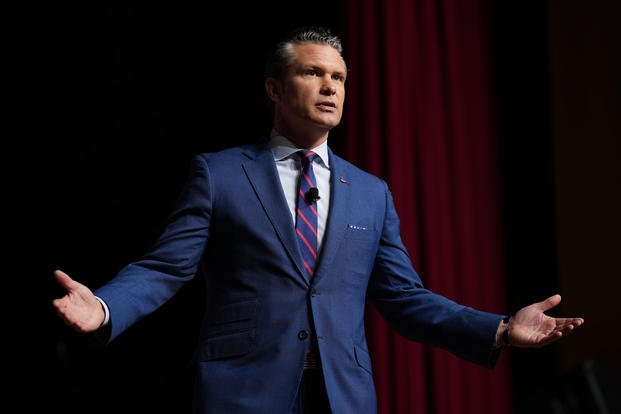At a memorial service in 2022, veteran Air Force Capt. Monte Watts bumped into a fellow former Minuteman III nuclear missile operator, who told him that she had non-Hodgkin lymphoma.
Watts knew other missileers with similar cancers. But the connection really hit home later that same January day, when the results of a blood test revealed that Watts himself had chronic lymphocytic leukemia, a type of non-Hodgkin lymphoma.
“I don’t know if it was ironic or serendipitous or what the right word is, but there it was,” Watts said.
Within the community of U.S. service members who staff nuclear missile silos scattered across the Northern Rockies and Great Plains, suspicions had long been brewing that their workplaces were unsafe. Just months after Watts was diagnosed in 2022, Lt. Col. Danny Sebeck, a former Air Force missileer who had transferred to the U.S. Space Force, wrote a brief on a potential cancer cluster among people who served at Minuteman III launch control centers on Malmstrom Air Force Base in Montana.
Sebeck identified 36 former workers[1] who served primarily from 1993 to 2011 and had been diagnosed with cancer, including himself. Of those, 11 had non-Hodgkin lymphoma; three had died. The Air Force responded swiftly to Sebeck’s findings, launching a massive investigation[2] into cancer cases and the environment at three intercontinental ballistic missile bases and a California launch facility. The goal is to complete the research by the end of 2025.
The service has released portions of the studies as they conclude, holding online town halls and briefings to highlight its findings. But while former missileers say they are heartened by the rapid response, they remain concerned that the research, which crosses decades and includes thousands of ICBM personnel and administrative workers, may address too large a population or use statistical analyses that won’t show a connection between their illnesses and their military service.
They need that tie to expedite benefits from the Department of Veterans Affairs.
Historically, the Department of Defense has been slow to recognize potential environmental diseases. Veterans sickened by exposure to Agent Orange in Vietnam, Marines who drank contaminated water at Camp Lejeune, North Carolina, and service members who lived and worked near burn pits in Iraq and Afghanistan fought for years to have their illnesses acknowledged as related to military service.
In the case of the missileers, the Air Force already had studied potential contamination and cancer at Malmstrom in 2001[3] and 2005[4]. That research concluded that launch control centers were “safe and healthy working environments.” But with Sebeck’s presentation and the decision to pursue further investigation, Air Force Global Strike Command — the unit responsible for managing nuclear missile silos and aircraft-based nuclear weapons — said the earlier studies may not have included a large enough sampling of medical records to be comprehensive.
Sebeck, who serves as co-director of the Torchlight Initiative, an advocacy group that supports ICBM personnel and their families, told congressional Democrats on April 8[5] that the Defense Department has not accurately tracked exposures to the community, making it difficult for veterans to prove a link and obtain VA health care and disability compensation.
“I had to go to a VA person and pull some papers,” Sebeck said, referring to the government system for recording service members’ environmental risks. “It says that I visited Poland once. It doesn’t mention that I pulled 148 alerts in a launch control center with polychlorinated biphenyls and with this contaminated air and water.”
PCBs — And the Missileers Exposed to Them
PCBs are synthetic chemicals once used in industry, including missile control electrical components such as display screens, keyboards, and circuit breakers. They have been banned for manufacture since 1979, deemed toxic and a likely carcinogen by the Environmental Protection Agency.
The Air Force’s Missile Community Cancer Study compares 14 types of common cancers in the general U.S. population and the missile community and also studies the environments at Malmstrom Air Force Base in Montana, F.E. Warren Air Force Base in Wyoming, Minot Air Force Base in North Dakota, and Vandenberg Space Force Base in California to determine whether they may have contributed to the risk of developing cancer.
The Malmstrom, Warren, and Minot bases together field 400 Minuteman III missiles, the land-based leg of the U.S. nuclear triad, which also includes submarine- and aircraft-launched nuclear weapons. The missiles are housed in silos spread across parts of Montana, North Dakota, Wyoming, Colorado, and Nebraska, staffed around the clock by missileers operating from underground, bunkerlike launch control centers.
So far, the Air Force investigation has found no “statistically elevated” deaths[6] from cancer in the missile community compared with the general population, and it found that the death rates for four types of common cancers — non-Hodgkin lymphoma, lung, colon and rectum, and prostate cancer — were significantly lower in missileers than in the general population.
Non-Hodgkin lymphoma accounted for roughly 5.8% of all cancer deaths among people who worked in launch control centers from January 1979 to December 2020.
Early results, derived from Defense Department medical records, found elevated rates of breast and prostate cancers in the missile community, but a later analysis incorporating additional data did not support those findings. The studies also did not find increased rates of non-Hodgkin lymphoma. Air Force officials noted during a June 4 online town hall, however, that these assessments are based on roughly half the data the service expects to review for its final epidemiological reports and cautioned against drawing conclusions given the limitations.
The final incidence report will include federal and state data, including information from civilian cancer registries, and delve into subgroups and exposures, which may “provide deeper insights into the complex relationship” between serving in the missile community and cancer risk, wrote Air Force Col. Richard Speakman in a September 2024 memo on the initial epidemiology results.
Gen. Thomas Bussiere, commander of Air Force Global Strike Command, said during the June town hall that only the final results will determine whether the missile community’s cancer rates are higher than the general population’s.
Some lawmakers share the concern of missileers about the Air Force study. Following the release of a University of North Carolina review[7] of Torchlight Initiative data that showed higher rates of non-Hodgkin lymphoma — at younger ages — among Malmstrom missileers, Rep. Don Bacon (R-Neb.) introduced an amendment[8] to a defense policy bill calling for the National Academies of Sciences, Engineering, and Medicine to review health and safety conditions in the facilities.
“Let’s make sure that we have some outside experts working with the Air Force studying cancer rates with our ICBM missions,” Bacon posted July 30 on the social platform X. “We want to ensure credibility and that whatever results come out, we’ve done total due diligence.”
Regarding additional studies on the working environments at the installations and a possible relationship between exposures and cancer risk, Speakman, who commands the Air Force School of Aerospace Medicine, said Malmstrom had two types of PCBs that the other two missile wing bases did not.
He added that benzene, found in cigarette smoke, vehicle exhaust, and gasoline fumes, was the largest contributor to cancer risk in reviews of the bases.
The assessment concluded that health risks to missileers is “low, but it’s not zero,” Speakman said. He said it would be appropriate to monitor the health of launch control workers.
Next Steps
Watts, whose story has been highlighted by the Torchlight Initiative, has asked the Defense Department’s inspector general to investigate — the watchdog agency referred his request to Global Strike Command — and is closely watching the Air Force research. He said the bulk of the cancer cases reported to Torchlight occurred in the 2000s, when ICBM personnel still used technology that contained PCBs, burned classified material such as treated paper and plastic coding devices indoors, and possibly were exposed to contaminated water.
“I open the door and there’s guys standing there in pressurized suits with sampling equipment,” Watts recalled. “They said, ‘We’re here to check for contaminated water.’ I look at my crew commander, and we’re standing there in cotton uniforms. I said, ‘Do you see anything wrong with this?’”
Launch control operators no longer burn code tapes indoors and the Air Force has made improvements to air circulation in the centers. Sebeck wants Congress to consider including missileers and others sickened by exposure to base contamination in the PACT Act, landmark legislation that mandates health care and benefits for veterans sickened by burn pits and other pollutants.
“It’s documented that there is a large cancer cluster in Montana, probably also in Wyoming. People act surprised, but all they have to do is go to the oncology office in Denver. I can find my missileer buddies there. We are sitting in the same chairs getting chemotherapy,” Sebeck said.
Air Force Global Strike Command spokesperson Maj. Lauren Linscott said in response to Sebeck’s remarks that the unit understands the impact of cancer on its personnel and is committed to supporting them.
“While current findings are preliminary and no conclusions can yet be drawn, we are dedicated to a rigorous, peer-reviewed, data-driven process to better understand potential health risks because the safety of our airmen is our top priority,” Linscott said.
Bills introduced in the House and Senate would address the situation. In addition to Bacon’s amendment, the Senate version of an annual defense policy bill would require a “deep cleaning” of launch control centers every five years until the sites are decommissioned as a new ICBM, the Sentinel, replaces the Minuteman IIIs.
The Air Force aims to release its final epidemiological report by the end of the year.
___
(KFF Health News[9] is a national newsroom that produces in-depth journalism about health issues and is one of the core operating programs of KFF [10]— the independent source for health policy research, polling and journalism.)
©2025 KFF Health News. Distributed by Tribune Content Agency, LLC.
© Copyright 2025 KFF Health News. All rights reserved. This material may not be published, broadcast, rewritten or redistributed.



